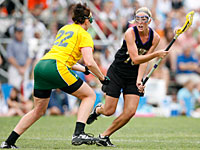NCAA News Archive - 2008
« back to 2008 | Back to NCAA News Archive Index
|
The NCAA News
The Women’s Sports Foundation has released the second in a series of research papers on athletics participation that, among other recommendations, calls for Congress to grant the NCAA a limited exemption to antitrust laws to allow the Association to control growth in athletics expenditures.
In “Who’s Playing College Sports? – Money, Race and Gender,” the WSF proposed a number of policy recommendations based on the research, including a federal allowance for the NCAA to regulate what the Foundation calls “an unsustainable rate of growth in athletics.”
“Individual institutions will not exercise restraint as long as one institution fails to exercise restraint,” the report says. “Thus, the national governance association must exercise overall restraint of all members.”
The report acknowledges previous NCAA attempts to control costs (the effort to limit assistant coaches’ salaries in the mid-1990s, for example) having run afoul of the Sherman Antitrust Act and thus calls for Congress to reverse that restriction to provide fiscal relief for major college programs.
NCAA officials say the Association already has considered seeking such an exemption (the NCAA in fact has commissioned a presidential task force to consider the matter as it relates to coaches’ salaries), but they are not confident such an appeal would be granted.
WSF spokesperson Marjorie Snyder, the Foundation’s chief program and planning officer, said the WSF “won’t start a campaign” to encourage Congress to act, but she encouraged the NCAA to look for what she called “right place, right time, right people” opportunities for the exemption.
“We’re not going to lead that effort, but we’re going to be supportive of it,” she said. “We think it should happen.”
The WSF believes money saved from controlling coaches’ salaries and other expenditures in football and basketball through an antitrust exemption could be diverted to support other sports, including men’s programs, not just women’s. “If you can contain some of those costs – a significant piece of which certainly is coaches’ salaries – we could at least stop the bleeding,” she said.
While the recommendation to seek relief from antitrust law is compelling, it is just one of several proposals Snyder says are important to “reframe the debate so that the short answer to why sports are added or dropped cannot be, ‘Because of Title IX.’”
Other policy recommendations the WSF proposed based on the research are:
• Urging the Office for Civil Rights to strengthen enforcement of Title IX. The report says women compose about 55 percent of college and university student bodies but receive only 41 percent of the athletics participation opportunities, a gap that has not significantly narrowed in recent years. The WSF wants the OCR to initiate compliance reviews of colleges and universities and actively ensure that those schools’ improvement plans are implemented.
• Having OCR rescind the 2005 policy clarification that allows schools to use an online survey to demonstrate compliance with the “interests and abilities” portion of the three-prong Title IX compliance test. The WSF prefers the 1996 policy standards that allow surveys only as one of many factors to determine women’s interests and abilities.
• Requiring institutions to conduct gender-equity and diversity assessments with accountability measures for noncompliance that include loss of eligibility for postseason championships. Gender and diversity compliance already are major priorities in the NCAA’s athletics certification program.
• Increasing participation at the grass-roots level in “nontraditional sports” in which athletes of color are under-represented. The Foundation wants these sports’ national governing bodies to “create new programs targeting under-represented groups and sensitize leaders of existing programs to make affirmative efforts to recruit and include athletes of color at the grass-roots level in all sports.”
The research, authored by John Cheslock at the University of Arizona’s Center for the Study of Higher Education, also encourages colleges and universities to tailor their sports sponsorship to athletics-participation dynamics at the high school level, and to consider adding sports with lower injury rates (and thus lower insurance costs).
For more information about the report, see the WSF home page.

